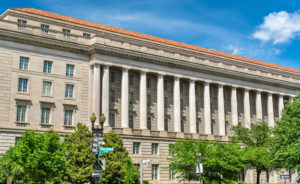
Justice Department intends to ban bump stocks, Commerce Department decides to include citizenship question on 2020 census, and more…
IN THE NEWS
- The U.S. Department of Justice and the Bureau of Alcohol, Tobacco, Firearms, and Explosives issued a notice of proposed rulemaking to ban bump stocks. The rule would categorize firearms that use bump stocks as “machineguns,” which are prohibited under federal law.
- The U.S. Department of Commerce decided to include a citizenship question on the 2020 census, which the Justice Department had asked for in December. Secretary of Commerce Wilbur Ross reasoned that “the need for accurate citizenship data and the limited burden that the reinstatement of the citizenship question would impose outweigh fears about a potentially lower response rate.” California Attorney General Xavier Becerra (D) objected to the decision—calling it unconstitutional and noting that it would dangerously undermine the accuracy of the census—and filed a federal lawsuit accordingly. Former U.S. Attorney General Eric H. Holder, Jr., reportedly said that, as Chairman of the National Democratic Redistricting Committee, he would sue the Trump Administration over its decision too.
- The Federal Trade Commission (FTC) announced that it is investigating Facebook’s privacy practice following news last week that Facebook sold user data to a political research firm in the 2016 election. Tom Pahl, Acting Director of the FTC’s Bureau of Consumer Protection said, “The FTC is firmly and fully committed to using all of its tools to protect the privacy of consumers.”
- The Campaign for Tobacco-Free Kids and other public health groups sued the U.S. Food and Drug Administration (FDA) for permitting candy flavored non-cigarette products such as e-cigarettes. The Campaign for Tobacco-Free Kids argued that because 81 percent of kids who have ever used tobacco products “like” the flavors, FDA should regulate all flavored tobacco products.
- A group of 10 Democratic senators issued a letter encouraging the Federal Communications Commission not to drop its Lifeline Program, which provides phone and Internet services to about 12 million Americans. The senators wrote that the Program is “essential” to Americans in the “digital economy” of today.
- Fan Yifei, Deputy Governor of the People’s Bank of China, reportedly said that the Bank would proceed with forming a new digital currency. The Bank will also reportedly regulate digital currencies more strictly in the upcoming year.
- The U.S. Consumer Product Safety Commission (CPSC) announced that it is seeking public input on “potential safety issues and hazards associated with Internet-connected consumer products.” The CPSC explained that because there has been an increase in the number of products with Internet connection and the dangers associated with the Internet, these products raise the risk of consumer hazards.
- Public Citizen sent a letter to William Hinman, Director of the Division of Corporation Finance of the U.S. Securities and Exchange Commission (SEC), asking the Division to examine disclosures made by public companies about their chief executive officer pay ratios. Required by the Dodd-Frank Wall Street Reform and Consumer Protection Act, these disclosures juxtapose median employee pay with that of the chief executive officer. Public Citizen worried “that the SEC may regard this disclosure without adequate care” which would “deprive investors of reliable information mandated by law.”
- In a proposed decision, a California state judge reportedly told coffee companies—including Starbucks and about 90 others—they must include warning labels about the carcinogen acrylamide, found in roasted coffee beans. The Council for Education and Research on Toxics brought the lawsuit originally eight years ago for failure to warn about acrylamide.
WHAT WE’RE READING THIS WEEK
- In an article for Bloomberg BNA, Hunton & Williams attorneys Andrew J. Turner and Alexandra Hamilton examined the Trump Administration’s “shift” away from guidance documents in its effort to cut regulations. Turner and Hamilton cited the Justice Department’s decision to bar guidance documents that “effectively bind private parties without undergoing the rulemaking process” and a subsequent memorandum preventing the Justice Department from making guidance documents binding by enforcing them. Turner and Hamilton argued that the memo “sends a strong signal to other regulatory agencies about the limits on the role of the use of guidance.”
- In a forthcoming paper for the Yale Law Journal, Maggie McKinley of the University of Pennsylvania Law School examined the participatory origins of the modern administrative state. McKinley argued that the participatory administrative state is grounded in constitutional and historical practice and affords minorities a real opportunity to participate more fully in the lawmaking process.
- In a forthcoming paper for the Stanford Journal of Law, Business, and Finance, William Magnuson of Texas A&M University School of Law argued that today’s financial regulatory scheme is unable to address “developments in financial technology, computing power, and networking theory.” Magnuson suggested that financial regulation focus on “improving information production” and “bolstering cybersecurity procedures.”



